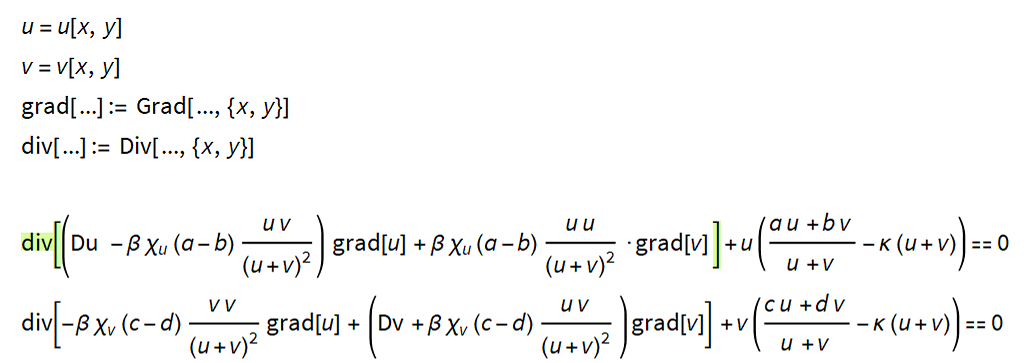Inspired by this post Solving the system of nonlinear PDE
I would like to discretize these two stationary nonlinear pde's for further use with FEMsolver of NDSolve.
parameters used:
{beta, chiu, chiv, kappa, Du, Dv} = {9, 0.3, 2.4, 0.001, 0.733, 0.733}
{a, b, c, d} = {-0.1, 0.4, 0, 0.2}
region = Rectangle[{-1, -1}, {1, 1}];
u0 = RandomVariate[NormalDistribution[22.222, 0.0001]];
v0 = RandomVariate[NormalDistribution[44.444, 0.0001]];
discretization (my unsuccessfull apporach...)
vd = NDSolve`VariableData[{"DependentVariables","Space" } -> {{u, v}, {x, y} }] ;
sd = NDSolve`SolutionData[{"Space"} -> {Discretize[region]} ]
c11 = Du - beta chiu (a - b) (u[x, y] v[x, y])/(u[x, y] + v[x, y])^2;
c12 = beta chiu (a - b) (u[x, y] u[x, y])/(u[x, y] + v[x, y])^2;
c21 = -beta chiv (c - d) (v[x, y] v[x, y])/(u[x, y] + v[x, y])^2;
c22 = Dv + beta chiv (c - d) (u[x, y] v[x, y])/(u[x, y] + v[x, y])^2;
cdata = InitializePDECoefficients[vd, sd,
"DiffusionCoefficients" -> { { -{{c11, 0}, {0, c11}}, -{{c12,0}, {0, c12}}}, {-{{c21 , 0}, {0, c21 }}, -{{c22, 0}, {0, c22}}} },
"ReactionCoefficients" -> {{ (a u[ x, y] + b v[ x, y])/(u[ x, y] + v[ x, y]) -
kappa*(u[ x, y] + v[ x, y]), 0}, {0, (c u[ x, y] + d v[ x, y])/(u[ x, y] + v[ x, y]) -
kappa*(u[ x, y] + v[ x, y]), 0} } ]
bcdata = InitializeBoundaryConditions[vd,sd, { {DirichletCondition[u[ x, y] == u0, True],DirichletCondition[v[ x, y] == v0, True]} }]
mdata = InitializePDEMethodData[vd, sd]
dpde = DiscretizePDE[cdata, mdata, sd, "SaveFiniteElements" -> True,"AssembleSystemMatrices" -> True]
Unfortunately the last step
{load, stiffness, damping, mass} = dpde["All"]
fails and gives the error "Set::shape: Lists {load,stiffness,damping,mass} and <<1>> are not the same shape."
Any ideas what went wrong here and how to correct it to make the nonlinear FEMmodel run? Thanks!


FEM"] $\endgroup$